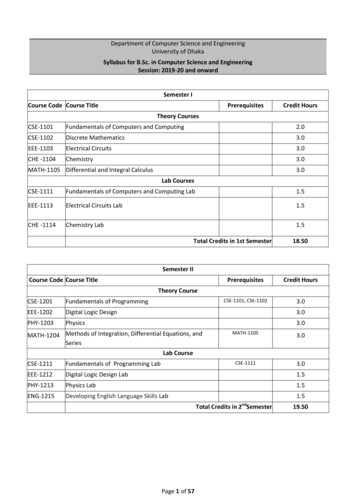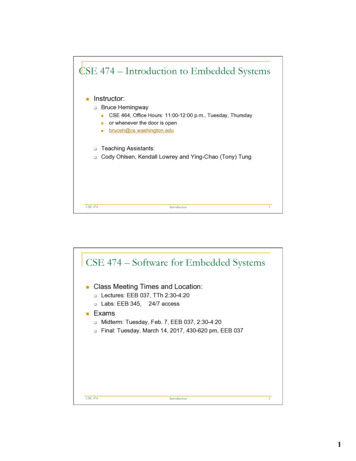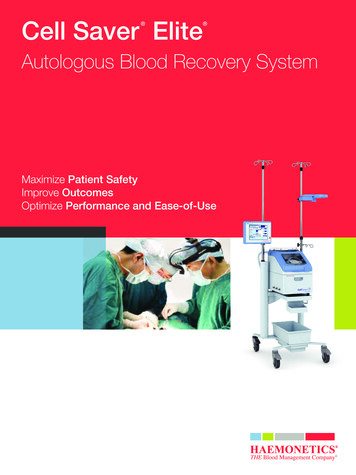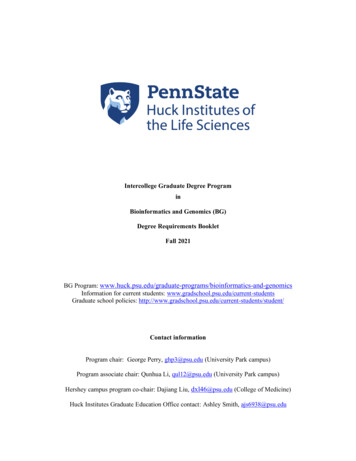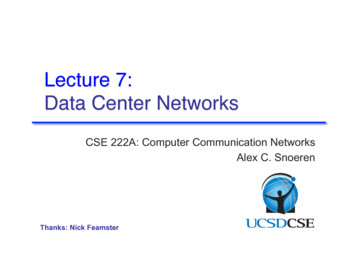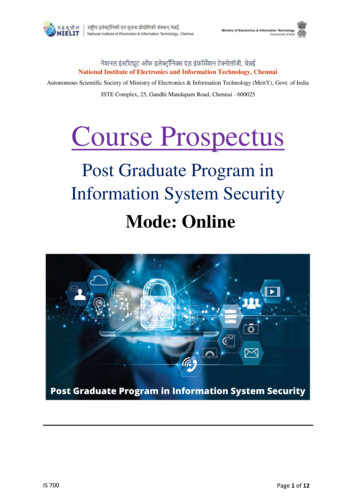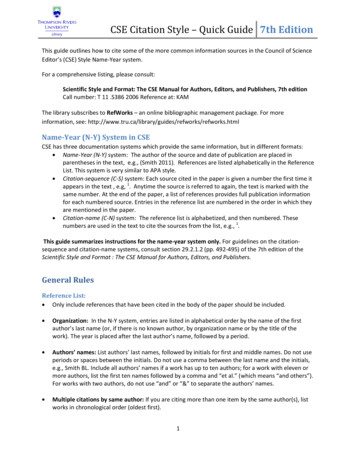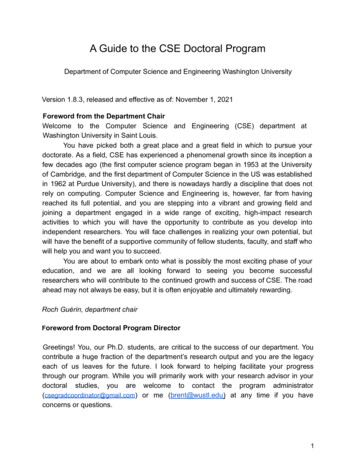
Transcription
A Guide to the CSE Doctoral ProgramDepartment of Computer Science and Engineering Washington UniversityVersion 1.8.3, released and effective as of: November 1, 2021Foreword from the Department ChairWelcome to the Computer Science and Engineering (CSE) department atWashington University in Saint Louis.You have picked both a great place and a great field in which to pursue yourdoctorate. As a field, CSE has experienced a phenomenal growth since its inception afew decades ago (the first computer science program began in 1953 at the Universityof Cambridge, and the first department of Computer Science in the US was establishedin 1962 at Purdue University), and there is nowadays hardly a discipline that does notrely on computing. Computer Science and Engineering is, however, far from havingreached its full potential, and you are stepping into a vibrant and growing field andjoining a department engaged in a wide range of exciting, high-impact researchactivities to which you will have the opportunity to contribute as you develop intoindependent researchers. You will face challenges in realizing your own potential, butwill have the benefit of a supportive community of fellow students, faculty, and staff whowill help you and want you to succeed.You are about to embark onto what is possibly the most exciting phase of youreducation, and we are all looking forward to seeing you become successfulresearchers who will contribute to the continued growth and success of CSE. The roadahead may not always be easy, but it is often enjoyable and ultimately rewarding.Roch Guérin, department chairForeword from Doctoral Program DirectorGreetings! You, our Ph.D. students, are critical to the success of our department. Youcontribute a huge fraction of the department’s research output and you are the legacyeach of us leaves for the future. I look forward to helping facilitate your progressthrough our program. While you will primarily work with your research advisor in yourdoctoral studies, you are welcome to contact the program administrator(csegradcoordinator@gmail.com) or me (brent@wustl.edu) at any time if you haveconcerns or questions.1
Michael Brent, program directorIntroduction to the CSE Doctoral ProgramsThis guide describes in detail the procedures and requirements for a Ph.D. in either ComputerScience or Computer Engineering. The Department implements, and in some cases extends,the requirements imposed by the Graduate School on all students seeking Ph.D. degrees. Therequirements imposed by the Graduate School are listed here. We assume that current andprospective students will be the primary users of this guide. The guide often uses “you” and“your,” which are always addressed to the student.Overview of Program RequirementsA Ph.D. is primarily a research degree, certifying that the recipient is able to conceive and carryout a program of original research. A Ph.D. recipient must also be able to effectivelycommunicate new research findings, both orally and in writing. Finally, the degree certifies ahigh level of competence and background knowledge in the recipient's subject area.Ph.D. students learn to formulate and execute a research program with the mentorshipand guidance of a research advisor, a faculty member who provides intensive mentoring andguidance throughout a student's doctoral career. The student's dissertation, a substantialoriginal research contribution required to obtain the Ph.D., is typically carried out as part of thisresearch program. Students enter our program without a predetermined research advisor andmust find an advisor among the faculty with full or courtesy appointments in CSE during theirfirst year.At various points during our students’ doctoral careers, they must pass milestones thatdemonstrate mastery of certain research skills and progress toward the dissertation. Ourprograms include three major milestones: an oral qualifying examination;a formal dissertationproposal; and completion and defense of the dissertation. In addition to these major milestones,students are expected to present their research regularly, both in external venues such ascompetitive academic conferences and internally through annual talks in our Doctoral StudentSeminar.In addition to performing research leading to a dissertation, CSE Ph.D. students mustcomplete coursework requirements, including both graded courses and participation in researchseminars. Courses include a set of breadth requirements designed to ensure that the studenthas a broad knowledge of CSE. All Ph.D. students must also satisfy a “mentored teachingexperience” (MTE) requirement by assisting a faculty member in teaching a course for onesemester (see Mentored Teaching Experience below for details).The Department offers two doctoral degrees: Computer Science, which spans a broadrange of subject areas unified by the study and use of computational methods, and ComputerEngineering, which focuses on the design and implementation of physical computing systemssuch as processors, custom computing logic, and communication fabrics. A student's choice ofdegree program depends on their specific interests within CSE and the interests of the faculty2
member who serves as the student's advisor. Program requirements are the same for ComputerScience and Computer Engineering students, except as noted below. Innovative research incomputer science is increasingly happening at the interface between CSE and other disciplinessuch as biology, physics, art, social sciences, data science, and various kinds of engineering. Asa department, we support interdisciplinary research agendas and the current requirementsreflect our efforts to be flexible, especially with regard to which courses are most appropriateand useful for each student.Getting Started: the First YearDuring your first year in the CSE Doctoral Program, your most important task is to integrateyourself into the department's research activities by finding a home in one of our researchgroups. You will also take a full load of courses, including CSE 591, designed to orient you tograduate research in general and the current research opportunities in this department.CSE 591: Introduction to Graduate StudyEvery new doctoral student must take CSE 591, “Introduction to Graduate Study,” during theirfirst fall semester. This course has two aims. First, it orients students to the breadth of researchin the CSE Department. You will hear presentations from a number of faculty members aboutthe work they do. Second, the course includes discussions and assignments to help developcritical research skills, such as selecting good problems, writing a research proposal, and timemanagement.An important function of CSE 591 is to help you narrow your choice of potential researchareas, and to show potential advisors what kind of work you can do. To promote these ends, 591includes two required one-month rotations, one each in October and November. During eachrotation, you will work with a faculty member, your “host,” on a short project that isrepresentative of the kind of work done in that person's group. You will attend your host's groupmeetings and get to know the students in the group. At the end of each rotation, you will presentthe results of your project to the class.The Role of the Research AdvisorEvery doctoral student must be mentored by a research advisor, a faculty member who isresponsible for directing their research and academic program. It is difficult to overstate yourresearch advisor's influence on your doctoral career. You will meet with this person more oftenthan anyone else in the department, long after you have satisfied all course requirements. Youwill work closely with your advisor on research and will likely publish many joint papers. Youradvisor will represent your interests to the department. Finally, your advisor will chair yourdissertation committee and will ultimately certify your readiness to graduate.3
Finding a Research Advisor: Rules, Procedures, and StrategiesIncoming first year students are unaffiliated, meaning they do not have a research advisor, andthey remain unaffiliated until they and a faculty member file an advisor affiliation form with thedepartment. The most common mechanism by which students become affiliated with facultymembers is through the two one-month rotations undertaken as part of CSE591 in the fallsemester. Students and faculty are discouraged from committing to an advising relationshipbefore the completion of the second rotation. If they do, the student must notify any otherrotation host immediately. Faculty members may be reluctant to host a second rotation for astudent who has already committed to joining another lab. In this case, the best approach isoften for the advisor to help recruit a second-rotation host in a research area related to her own.How to arrange a rotation with a prospective research advisor: fallInformation about rotation opportunities can be found at https://rotations.cse.wustl.edu/. Thissite includes information about a faculty member’s research area, how many advisees theyexpect to take during the current academic year, how many students they have alreadycommitted to take for rotations, and how many new advisees they have already committed to.When choosing a rotation, you may want to consider the probability of being offered a positionin the group. For example, if a faculty member expects to take at most one new graduatestudent and has already committed to four rotations, you may want to take that into account.You should browse the rotations web site early in the fall semester and send email tofaculty members with whom you would like to discuss a rotation. The first step is to arrange anin-person meeting. Before the meeting, do your homework by learning about the facultymember's research from their web pages and publications. Ideally, you want to have a rotationconfirmed at least a week or two before it is supposed to start.How to arrange a rotation with a prospective research advisor: After fallTypically, a majority of students will find an advisor during the fall semester, but others will not.If you have not filed a research lab affiliation form by the end of classes in the fall, it is time tostart arranging additional rotations. You can negotiate the duration of additional rotations withthe faculty member, but they should not exceed eight weeks. Ideally, you should be doingrotations almost back-to-back until you and an advisor have filed a lab affiliation form. For eachadditional rotation, the faculty member must notify the department by filling out this form.Avoiding rotation spilloverProspective advisors who have not yet affiliated with a student may not ask the student to doresearch work before or after a formal rotation. In the fall semester, a faculty member mayprovide extra research opportunities before October 1 or between December 1 and December31, but only if asked to by a student. Between January 1 and August 31, each rotation islimited to at most eight weeks. Rotations are expected to fill all of the time a student hasavailable for research, so faculty members may not ask a student to carry out research while4
rotating with another faculty member. If a student receives such a request, he or she mustdecline.Deadline for affiliating with a research advisorYou must find a research advisor by August 31st of the summer after beginning the PhDprogram in order to continue in the program. Students are strongly encouraged to acquire aresearch advisor as soon as possible after completing the second rotation. That is the naturaltime to discuss committing to a mentoring relationship with a faculty member. That commitmentrequires filing a form with the department. If you and your prospective advisor have not filedthe affiliation form, you do not have a research advisor.You may receive a letter naming a faculty member as your academic advisor. This personis temporarily assigned to help you select your courses but is not your research advisor.Changing AdvisorsThe advising relationship is established and continued only by the mutual consent of studentand faculty member. You have the option at any time to seek a new research advisor. If youfeel that switching research advisors is in your best interest, the faculty will do what we can totry to make the transition possible, beneficial, and amicable for all involved. Similarly, if thefaculty member chooses to end the advising relationship, and if you are making adequateprogress toward a Ph.D., we will help you find a new advisor if possible.What to do in case of student-advisor conflictThe relationship between an advisor and a student is normally one of mutual positive regardand respect. It is rare, but not unheard of, for a student to feel that their advisor is treatingthem unfairly or inappropriately. If that happens to you, you are encouraged to discuss thesituation with the Doctoral Program Director or, if you prefer, the department chair or anymember of the Doctoral Studies Committee. Whoever you confide in will make every effort tomaintain your anonymity, although in some cases allegations must be reported to the DSC ordepartment chair. The DSC and the department chair will protect any student who lodges acomplaint from adverse consequences of reporting that complaint. Advisors are expected tomaintain a professional and respectful relationship with students. This precludes, for example,asking a student to carry out tasks not directly related to their academic progress, asking aboutor commenting on a student’s personal life outside the academic context, yelling at a student,using abusive or offensive language, or placing inappropriate conditions on the student’sprogress through the program. While students interested in academic careers are encouragedto participate in writing grant proposals, the ultimate responsibility for funding lies with theadvisor. Writing grant proposals is not a requirement for progress in or completion of thedoctoral program.5
Course and Credit RequirementsOverall Credit RequirementsYou need a total of 72 credits. Credits come from three kinds of work: regular courses,seminars, and research credit.Regular Courses At least 33 of your credits must be from regular (non-seminar) courses eligible forgraduate credit. At least 18 of these credits must be from CSE courses, either taken at WashingtonUniversity or approved by us for transfer credit. At least 9 of these credits must be from regular CSE courses taken at WashingtonUniversity. At most 9 of your 33 course credits may be from 400-level courses. At most 9 of your 33 may be from graduate-level independent study (CSE 500 or 600). Any other credits for CSE courses must be from graded courses at 500 level or above. Courses taken at Washington University outside the CSE department may be countedfor degree credit with your advisor's approval. Such courses must be relevant toyour research area and at the 400-level or above.SeminarsAt least 3 of your credits must come from CSE research seminars. These seminars, whosecourse numbers are of the form CSE 7xxx, entail both discussion and oral presentation bystudents of cutting-edge research. CSE doctoral students may receive only one credit persemester for any one research seminar, and that seminar grade should be one of “satisfactory”or “unsatisfactory,” rather than a letter grade. You may, however, take multiple seminars persemester and may take a given seminar for as many semesters as you like, since the topicschange each semester.Research CreditsAt least 24 of your credits must be research credit, taken in the form of CSE 699 “DoctoralResearch.” Research credit must be arranged with your research advisor each semester.You may take up to 12 research credits per semester. Grades for CSE 699 are recorded asSatisfactory/Unsatisfactory. Students should enroll with the grade option of U/S. Instructorswill add an S grade for semesters a student is performing satisfactorily and a U if not.Transferring Credits from Outside Washington UniversityCredits counted toward your Ph.D. requirements may include no more than 24 credits6
transferred from another institution. Transfer credit is granted only for regular courses(not seminars or research) that are appropriate substitutes for work that would haveotherwise been done as part of our Ph.D. program. A course taken at another institutionmust meet all of the following requirements to be eligible for transfer credit:1. The course must be considered acceptable for credit toward a PhD at the institutionwhere it was taught.2. The course must not have been used to satisfy an undergraduate degree requirement.Because this determination is often difficult for us to make, our usual rule is that youmust have had graduate standing when you took the course. Courses taken as part ofa master's or doctoral program, a graduate certification program, or as an SNCD(student not candidate for degree) are all eligible.3. The CSE Department must approve the transfer after reviewing the course's content andyour grade for the course. Generally, the decision to approve is made by a facultymember with expertise in the subject area of the course to be transferred.Applying for Transfer CreditTo request that credits from another institution be transferred, please fill out the form athttps://forms.gle/qgiUeGBTjhdZiaew5 for each course you wish to transfer. Please also sendyour transcript in electronic form to the DSD and the program coordinator and inform themthat you have filled out the forms requesting credit.The procedure for deciding whether to accept transfer credit for the PhD:1. If the institution grants PhDs in CS or a closely related discipline, has a significantresearch enterprise, and there is no reason to suspect it of low standards, it isacceptable. Institutions that grant an MS in CS but not a PhD require more investigation/ discussion.2. If the course is eligible for PhD credit at the institution where it was taken, then a. If itis listed as a CSE course we accept it for CSE credit (18 CSE credits arerequired).b. If it has a close analog at WU that would be accepted for CSE PhD credit herewe accept it for CSE credit.c. If neither of the above hold, we accept it as a non-CSE graduate credit.Applying Credit from another Washington University DegreeIf you complete a Washington University master's degree in CS or CoE, you may apply all 30credits completed for these degrees toward the credits needed for the Ph.D. Note that all MScredits, including those for CSE 599 “Master’s Research” (typically taken as part of a thesisor project), are considered course credits relative to our doctoral programs and count towardyour 33 non-seminar credit requirement. They cannot be counted as doctoral research credit.7
Breadth RequirementsAn important component of your required course credits is a set of breadth requirements, whichensure that you have a sufficiently broad base of general knowledge in the area of yourdoctoral program. For the PhD in Computer Science, you must complete one course in each ofthe following 3 breadth areas:Theory of Computing CSE 541T: Advanced AlgorithmsComputer Systems CSE 422S: Operating Systems CSE 522S: Advanced Operating Systems CSE 560M: Computer Systems Architecture IData Science CSE 417T: Introduction to Machine Learning CSE 412A: Introduction to Artificial Intelligence CSE 514A: Data Mining CSE 517A: Machine LearningFor the PhD in Computer Engineering, you must complete one course in each of thefollowing 3 breadth areas:Theory ESE 520: Probability and Stochastic Processes CSE 541T: Advanced Algorithms CSE 547: Introduction to Formal Languages and AutomataComputer Architecture CSE 560M: Computer Systems Architecture IDesign ESE 461A: Design Automation for Integrated Circuit Systems CSE 463M: Digital Integrated Circuit Design and Architecture CSE 521S: Wireless Sensor Networks CSE 523S: Systems Security ESE 562: Analog Integrated Circuits8
Only courses taken at Washington University with a grade of B- or higher may be used tosatisfy the breadth requirements. Students who receive transfer credit for CSE 541T can fulfillthe theory breadth requirement with another 500-level CSE course with the "T" suffix.The breadth requirement must be satisfied by the end of the 5th semester. Studentsfailing to meet this deadline will be placed on probation during which they mustsatisfy the requirement.Planning your coursework for your first two yearsYou should try to complete your breadth requirements in your first 2, or at most 3 semesters.Plan this in advance as they are not offered every semester. Also, it would be a mistake toload up on courses in your first three semesters, preventing you from making researchprogress. Most students will progress better if they take no more than two courses in their 2nd,3rd, and 4th, semesters, leaving significant time for research progress.Enrollment and Residency RequirementsAll Ph.D. students must either be enrolled full-time or registered as a nonresident candidateevery semester until graduation. Full-time enrollment is achieved by registering for at least 9units per semester. If you have reached the 72 credit hours required by the program, you canmaintain full-time status by registering for either LGS 9000 (Full-time GraduateResearch/Study) or LGS 9001 (Full-time Graduate Study in Absentia) that indicates thestudent's full-time engagement in research or academic writing. Both of these courses requiredepartmental approval. LGS 9001 is for students who will be completing research away fromthe university. These cases need to be approved by the Graduate School, the student’s advisor,and the department. Students are allowed to register for LGS 9001 for up to four fall/springsemesters, and these are counted towards the student’s program length. Full details of thegraduate school’s enrollment and residency requirements can be found here.ResidencyAll students must fulfill a one-year residency requirement. Residency is satisfied by registeringfor at least 9 units in each of two consecutive academic semesters at some time in yourdoctoral career. A full 9 units must be taken in each semester of residency; it is not sufficient toregister for LGS 9000 for those semesters. If you transferred to Ph.D. status from a WU CSEMaster's Program, consecutive semesters spent enrolled full-time in that program may be usedto satisfy your residency requirement. Residency requires full participation in the life of theDepartment. For part-time students who work full time, the Department requires that you reducethe amount of time you spend at work by at least 50% during the residency period. You willhave a desk andall the responsibilities of a full-time doctoral student (e.g. attending colloquia) duringyour residency.9
Training in TeachingThe skills required to obtain a Ph.D. include not only mastery of core and specialized CSEknowledge but also the ability to communicate this knowledge to others. Teaching skillsare especially important if you choose to pursue an academic career, but similar abilitiesare required in industrial research and many areas of public life. Our Ph.D. programstherefore require you to satisfy teaching requirements as part of obtaining your degree.There are three aspects of the Teaching Requirement that must be completed priorto graduation: scholarly communication, by participating in the Doctoral Student ResearchSeminar;mentored teaching, by acting as a teacher or course TA (officially called AI,for Assistant in Instruction, but for obvious reasons I will abbreviate with TArather than AI).pedagogy training, before and during the mentored teaching experienceScholarly Communication RequirementAll doctoral students are expected to gain proficiency in oral communication of researchresults to an audience of scholars, who may be either your peers or the research communityat large. Various parts of your doctoral training, such as your research seminars, your oralqualifying exam, and communication of your own doctoral research will help you build skills inthis area.Doctoral Student Research SeminarThe Department's Graduate Student Association organizes a regular non-credit seminar inwhich doctoral students present their ongoing research. If a student feels that their results arenot ready to be presented, they present the problem they are working on, along withappropriate background, and the approaches they are taking to that problem. This seminarprovides an opportunity to practice the skills of talk preparation and presentation.The format of the seminar is two 20-minute slots. Each slot is devoted to aconference-style presentation by one student, followed by time for questions and then oralfeedback on the presentation from faculty members appointed to judge it. Talks should providesufficient background that anyone in the department can grasp the goals and significance ofthe work. In particular, the talk should not be pitched to an audience within your own researcharea. Presentations are typically fairly polished (practicing is strongly recommended). Audiencemembers provide anonymous feedback to speakers in the form of comment sheets filled out10
during the seminar. Talks are announced in advance by posted abstract, which should be sentto the seminar organizer(s) about a week in advance of a presentation.As a requirement of graduation, all Ph.D. students must give at least one DSS talkthat receives a rating of “met requirements” from both faculty judges. We expect moststudents to give multiple talks before satisfying this requirement. Students who take researchcredits (699 or LGS 9000) are required to present once per year until they meet therequirement. Students who take research credits only in spring may present the following fall. Astudent may ask to give additional DSS talks, beyond one per year, if needed to pass thisrequirement in time for their thesis defense. All students who have not yet met the requirementmust attend the presentations by other students and those who have met it are encouraged tocontinue attending to support their peers.Mentored Teaching ExperienceThe Mentored Teaching Experience (MTE) consists of a minimum of 14 hours of contact withstudents and will also typically require about 10 hours per week of participation in courseadministration such as grading assignments, answering students’ questions online, and othersuch duties as assigned by the course instructor. The 14 contact hours are organized intotwo levels.1. Level 1. At least 4 hours of lecture, traditional recitation section, lab section, or structuredstudio. The defining features are that (a) the MTE student must prepare and plan thesession in advance, and (b) the MTE student must be in charge of a group of 3 or morestudents engaged in some form of planned, structured learning experience. The MTEstudent should record the names of the students in attendance. Office hours or 1-on-1help do not satisfy this requirement. If the student engages in more than 4 hours of thisactivity, the additional hours can count toward the Level 2 requirement.2. Level 2. At least 10 hours of some combination of (a) and (b) below:a. Helping students 1-on-1, in person. These can be in scheduled office hours or adhoc meetings. The MTE student should record the names of the students he orshe helped and the approximate time spent. Or,b. Designing and grading significant new assignments and writing a one-page reflectionon how they went, including strengths and weaknesses. The reflection should be turnedin to and discussed with the mentor in charge of the course. Hours devoted to either ofthese two options can be combined to satisfy the requirement.In addition to the specific requirements above, MTE students are required to help runthe course throughout the semester as needed. The total time commitment for the MTEshould be similar to that of a 3-unit course, i.e. not more than about 12-14 hours per week, onaverage. However, the time required may vary significantly from week to week.MTE mentors must be faculty members in the CSE department or have acourtesy appointment in CSE. If the person in charge of a course is a student or adjunctfaculty member they cannot serve as an MTE mentor.11
The mentor should submit an online MTE Commitment Form before the beginning of thesemester and an MTE Completion Form at the end. The student should enroll in both LGS 600(0 credits, just for the Graduate School’s record keeping system) and CSE 802, MentoredTeaching Experience (3 credits), for the semester in which they plan to satisfy the teachingrequirement. Grades for CSE 802 are recorded with grade types of Credit or Pass/Fail.When the Commitment form is completed, students should enroll with the grade optionapproved of by the instructor. Finally, MTE students must register for and participate in“CSE 7001 Research Seminar on Computer Science Pedagogy”, a 1-credit seminar thatmeets once per week to discuss approaches to teaching computer science.Pedagogy trainingThe university has a Teaching Center that provides many short workshops on teachingtechniques and approaches. These span the range from university policies to the latestteaching techniques based on empirical research. Their most basic workshop is GraduateStudent Mentored Teaching Orientation, which is offered about a week to 10 days before thebeginning of classes. Immediately before the semester in which they register for MTE, allstudents must register and participate in this workshop, which takes most of a day. In addition,you must participate in at least one of the Teaching Center’s “Foundations in Teaching”workshops, which are typically a single session of 1.5 to 2 hours. This second workshop mustbe completed before the MTE requirement is satisfied. You are encouraged to do it in thesemester before your MTE or early in the semester of your MTE. All students who do not havean undergraduate degree from a
A Guide to the CSE Doctoral Program Department of Computer Science and Engineering Washington University Version 1.8.3, released and effective as of: November 1, 2021 . few decades ago (the first computer science program began in 1953 at the University of Cambridge, and the first department of Computer Science in the US was established
